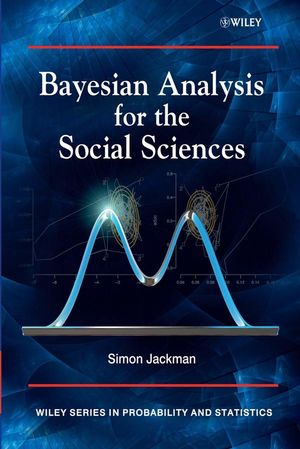Bayesian Analysis for the Social SciencesISBN: 978-0-470-01154-6
Hardcover
608 pages
December 2009
 This is a Print-on-Demand title. It will be printed specifically to fill your order. Please allow an additional 10-15 days delivery time. The book is not returnable.
|
||||||
List of Tables.
Preface.
Acknowledgments.
Introduction.
Part I: Introducing Bayesian Analysis.
1. The foundations of Bayesian inference.
1.1 What is probability?
1.2 Subjective probability in Bayesian statistics.
1.3 Bayes theorem, discrete case.
1.4 Bayes theorem, continuous parameter.
1.5 Parameters as random variables, beliefs as distributions.
1.6 Communicating the results of a Bayesian analysis.
1.7 Asymptotic properties of posterior distributions.
1.8 Bayesian hypothesis testing.
1.9 From subjective beliefs to parameters and models.
1.10 Historical note.
2. Getting started: Bayesian analysis for simple models.
2.1 Learning about probabilities, rates and proportions.
2.2 Associations between binary variables.
2.3 Learning from counts.
2.4 Learning about a normal mean and variance.
2.5 Regression models.
2.6 Further reading.
Part II: Simulation Based Bayesian Analysis.
3. Monte Carlo methods.
3.1 Simulation consistency.
3.2 Inference for functions of parameters.
3.3 Marginalization via Monte Carlo integration.
3.4 Sampling algorithms.
3.5 Further reading.
4. Markov chains.
4.1 Notation and definitions.
4.2 Properties of Markov chains.
4.3 Convergence of Markov chains.
4.4 Limit theorems for Markov chains.
4.5 Further reading.
5. Markov chain Monte Carlo.
5.1 Metropolis-Hastings algorithm.
5.2 Gibbs sampling.
6. Implementing Markov chain Monte Carlo.
6.1 Software for Markov chain Monte Carlo.
6.2 Assessing convergence and run-length.
6.3 Working with BUGS/JAGS from R.
6.4 Tricks of the trade.
6.5 Other examples.
6.6 Further reading.
Part III: Advanced Applications in the Social Sciences.
7. Hierarchical Statistical Models.
7.1 Data and parameters that vary by groups: the case for hierarchical modeling.
7.2 ANOVA as a hierarchical model.
7.3 Hierarchical models for longitudinal data.
7.4 Hierarchical models for non-normal data.
7.5 Multi-level models.
8. Bayesian analysis of choice making.
8.1 Regression models for binary responses.
8.2 Ordered outcomes.
8.3 Multinomial outcomes.
8.4 Multinomial probit.
9. Bayesian approaches to measurement.
9.1 Bayesian inference for latent states.
9.2 Factor analysis.
9.3 Item-response models.
9.4 Dynamic measurement models.
Part IV: Appendices.
Appendix A: Working with vectors and matrices.
Appendix B: Probability review.
B.1 Foundations of probability.
B.2 Probability densities and mass functions.
B.3 Convergence of sequences of random variabales.
Appendix C: Proofs of selected propositions.
C.1 Products of normal densities.
C.2 Conjugate analysis of normal data.
C.3 Asymptotic normality of the posterior density.
References.
Topic index.
Author index.



